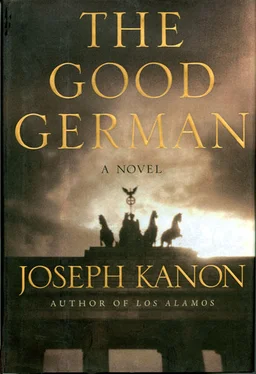“Thank you,” Jake said, taking them.
“They are expensive.”
“That doesn’t matter.”
“A valuable girl,” Rosen said wryly.
“She’s not what you think.”
“It doesn’t matter what I think. Just give her the tablets.” He glanced toward the couch. “You have two here?”
Jake turned away, feeling like Danny stung by Sikorsky’s money. But who cared what Rosen thought?
“Did she tell you she had an abortion?” Jake said.
“She didn’t have to. That’s what I do.”
“Are you a real doctor?”
“You’re a fine one to ask for credentials,” Rosen said, then sighed and took another gulp of coffee. “I was a medical student in Leipzig, but of course I was thrown out. I became a doctor in the camp. No one asked for a degree there. Don’t worry, I know what I’m doing.”
“And now you work for Danny.”
“You have to live somehow. You learn that in the camp too.” He put down the coffee cup, ready to go. “So, the tablets, don’t forget,” he said, getting up. “I’ll come tomorrow. You have something on account?”
Jake handed him some money. “Is this enough?”
He nodded. “The penicillin will be more.”
“Anything. Just get it. But she’ll be all right?”
“If you keep her off the streets. At least no Russians. They’re all diseased.”
“She’s not a whore.”
“Well, I’m not a doctor, either. Such niceties.” He turned to go.
“What time tomorrow?”
“After dark. But not so late as this, please. Not even for Danny.”
“I can’t thank you enough.”
“You don’t have to thank me at all. Just pay me.”
“You’re wrong about her,” Jake said, wondering why it mattered. “She’s a respectable woman. I love her.”
Rosen’s face softened, surprised at the words, something from a forgotten language. “Yes?” he said. He turned away again, his eyes weary. “Then don’t ask about the abortion. Just give her the tablets.”
Jake waited until the steps had died away in the stairwell before he closed the door. Don’t ask. But how could he not? Worth putting your life at risk. A matter of hygiene. He put the cup in the sink, then turned out the light and started down the hall, exhausted.
She was sleeping, her face smooth in the soft glow of the lamp. The way he had imagined it, the two of them in bed, his bed even, holding each other as if the war hadn’t happened. But not yet. He sank onto the chair and took off his shoes. He’d wait here until it was light, then wake Hannelore to keep watch. But the chair was springy, poking at him like thoughts. He went over and lay down on his side of the bed, still in uniform. On top of the sheet, so he wouldn’t disturb her. When he reached over to switch off the light, she stirred with a kind of dreamy restlessness. Then, as he lay staring up at the dark, she took his hand and held it.
“Jacob,” she whispered.
“Ssh. It’s all right, I’m here.”
She tossed a little, her head moving in a slow rhythm, so that he realized she was still asleep, that he’d become part of the dream.
“Don’t tell Emil,” she said, her voice not quite in the room. “About the child. Promise me.”
“I promise,” he said, and then her body relaxed, her hand still locked in his, peacefully, while he lay staring at the ceiling, wide awake.
Lena slept through most of the next day, as if his being there had finally allowed her to be really sick, not to have to make the effort to get up. He took the time out to get things: the jeep, miraculously still there; money from his army account; supplies at the PX, goods bulging on the shelves and piled high on the floor; a change of clothes at Gelferstrasse. Life errands. He threw his battered portable into the bag with his clothes, then told the old couple he’d be away for a day or two and was there any food he could take? More cans. The old man handed him something wrapped in paper, about the size of a bar of soap.
“Nobody in Germany has had butter for a long time,” he said, and Jake nodded, a conspirator.
At the press camp, where he went to collect messages, there were sandwiches and doughnuts. He filled another bag.
‘Well, somebody got lucky, I see,“ Ron said, handing him a press release. ”Today’s schedule, if you care. And details on the U.S. dinner a good time was had by all. It was, too. I hear Churchill got pissed. Take the ham sandwiches, it’s what they like. Can’t get enough ham, the frauleins. Need any rubbers?“
“Somebody ought to spank you.”
Ron grinned. “You’ll thank me later, believe me. You don’t want to go home with pus between your legs. By the way, they loved you in the newsreel. Maybe they’ll use it.”
Jake looked at him, puzzled, then shrugged it off, not wanting to talk.
“Don’t be a stranger,” Ron said as he hurried out.
But he already was. Potsdam, even tiddly Churchill, felt a million miles away. When he passed the flags in front of the headquarters building, he felt he was leaving a foreign country, saluting itself, a provider of tins. He glanced at the full sacks on the seat beside him. They’d eat out of cans, but they’d eat. In the bright sunshine, the villas and trees in Grunewald were as lovely as ever. Why hadn’t he noticed before? He didn’t see the rubble as he sped up the Kurfurstendamm, just the happy morning light. For a moment it seemed still lined with shops. The important thing was to get fluids into her to prevent dehydration. Soup, every mother’s remedy.
As Ron had predicted, Hannelore fell on the sandwiches.
“Ham, my god. And white bread. No wonder you won the war, to eat like this. We were starving.”
“Save one, okay?” he said, watching her gobble it down. “How’s Lena?”
“Sleeping. How she can sleep, that one. What’s that?”
“Soup,” he said, putting the pot on the ring.
“Soup,” she said, a child at Christmas. “Is there another tin, maybe? My friend Annemarie, she would be so grateful.”
The thought of getting her out of the house made him generous. He handed her two cans, then a pack of cigarettes.
“These are for you.”
“Luckies,” she said in English. “You’re not a bad sort.”
When he took the soup in, Lena was awake, looking out the window. Still pale. He felt her forehead. Not as bad as before, but still feverish. He began to spoon soup for her, but she took it from him, sitting up.
“No, I can feed myself.”
“Hike doing it.”
“You’ll make me an invalid. I feel so lazy.”
“Never mind. I’ve got nothing better to do.”
“You should work,” she said, and he laughed-a sign of life, the way she used to scold him back to the typewriter.
“Would you like anything?”
“A bath, but there’s no hot water. It’s terrible, how we all smell.”
“I hadn’t noticed,” he said, kissing her forehead. “Let me see what I can do.”
It took forever. The boiling water seemed to turn cold the minute it touched the porcelain, so he had to carry more pots from the gas ring like a slow conveyor belt, until finally he had a shallow bath, not really hot but a little better than tepid. He thought of Gelferstrasse and its steaming tub.
“Soap,” she said. “Where did you get it?”
“U.S. Army. Come on, hop in.”
But she hesitated, the old self-consciousness. “You don’t mind?” she said, indicating the door.
“You didn’t use to be so shy.”
In the same tub, bubbles covering her breasts, laughing at him when he patted her dry, getting himself wet.
“Please. I’m so thin.”
He nodded and closed the door behind him, then went into the bedroom. Musty, despite the open window; rumpled sheets Hannelore probably hadn’t changed in weeks. But how could she have washed them? The smallest household task had become an ordeal. He found another set in the closet and changed the bed while he listened to the splashing next door. Hospital corners, everything stretched tightly.
Читать дальше












